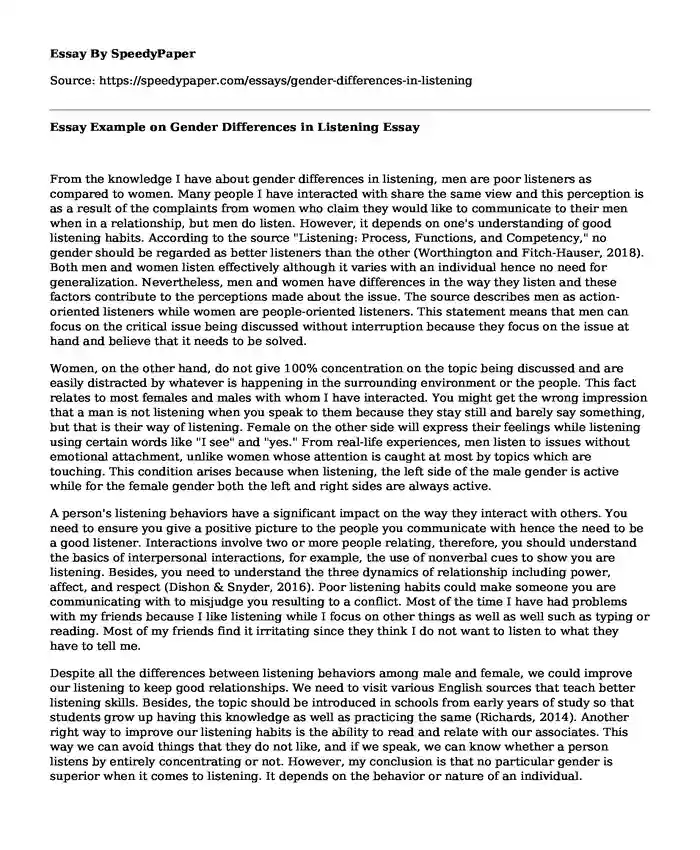
| Type of paper: | Essay |
| Categories: | Gender Communication skills |
| Pages: | 3 |
| Wordcount: | 644 words |
From the knowledge I have about gender differences in listening, men are poor listeners as compared to women. Many people I have interacted with share the same view and this perception is as a result of the complaints from women who claim they would like to communicate to their men when in a relationship, but men do listen. However, it depends on one's understanding of good listening habits. According to the source "Listening: Process, Functions, and Competency," no gender should be regarded as better listeners than the other (Worthington and Fitch-Hauser, 2018). Both men and women listen effectively although it varies with an individual hence no need for generalization. Nevertheless, men and women have differences in the way they listen and these factors contribute to the perceptions made about the issue. The source describes men as action-oriented listeners while women are people-oriented listeners. This statement means that men can focus on the critical issue being discussed without interruption because they focus on the issue at hand and believe that it needs to be solved.
Women, on the other hand, do not give 100% concentration on the topic being discussed and are easily distracted by whatever is happening in the surrounding environment or the people. This fact relates to most females and males with whom I have interacted. You might get the wrong impression that a man is not listening when you speak to them because they stay still and barely say something, but that is their way of listening. Female on the other side will express their feelings while listening using certain words like "I see" and "yes." From real-life experiences, men listen to issues without emotional attachment, unlike women whose attention is caught at most by topics which are touching. This condition arises because when listening, the left side of the male gender is active while for the female gender both the left and right sides are always active.
A person's listening behaviors have a significant impact on the way they interact with others. You need to ensure you give a positive picture to the people you communicate with hence the need to be a good listener. Interactions involve two or more people relating, therefore, you should understand the basics of interpersonal interactions, for example, the use of nonverbal cues to show you are listening. Besides, you need to understand the three dynamics of relationship including power, affect, and respect (Dishon & Snyder, 2016). Poor listening habits could make someone you are communicating with to misjudge you resulting to a conflict. Most of the time I have had problems with my friends because I like listening while I focus on other things as well as well such as typing or reading. Most of my friends find it irritating since they think I do not want to listen to what they have to tell me.
Despite all the differences between listening behaviors among male and female, we could improve our listening to keep good relationships. We need to visit various English sources that teach better listening skills. Besides, the topic should be introduced in schools from early years of study so that students grow up having this knowledge as well as practicing the same (Richards, 2014). Another right way to improve our listening habits is the ability to read and relate with our associates. This way we can avoid things that they do not like, and if we speak, we can know whether a person listens by entirely concentrating or not. However, my conclusion is that no particular gender is superior when it comes to listening. It depends on the behavior or nature of an individual.
Reference
Dishion, T. J., & Snyder, J. J. (Eds.). (2016). The Oxford handbook of coercive relationship dynamics. Oxford University Press.
Richards, T. (2014). Listen to patients first. BMJ: British Medical Journal (Online), 349.
Worthington, D., & Fitch-Hauser, M. (2018). Listening: Processes, functions, and competency. Routledge.
Cite this page
Essay Example on Gender Differences in Listening. (2022, Jun 24). Retrieved from https://speedypaper.net/essays/gender-differences-in-listening
Request Removal
If you are the original author of this essay and no longer wish to have it published on the SpeedyPaper website, please click below to request its removal:
- Free Essay on Critical Role of Nursing in Enriching People's Lives
- Free Essay on Organizational Behavior
- Free Essay Dedicated to the Legalization of Marijuana
- Designing Benefit Plans - HRM Essay Example
- Essay Sample on Gender Stereotype in Children Literature
- What the Survey Will Reveal. Paper Sample
- Essay Example: Oil Wealth and the Resource Curse in Venezuela
Popular categories




